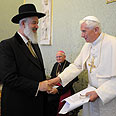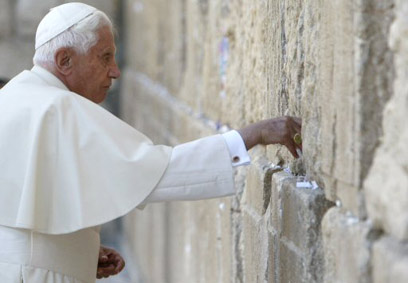
Top rabbis bid farewell to Benedict XVI
Israel's Chief Rabbi Metzger says retiring pope's eight-year rule characterized by 'best relations ever between Church and Rabbinate.' President of Conference of European Rabbis hopes Benedict's successor will fight anti-Semitism
VIDEO – Chief Rabbinate officials on Sunday expressed sadness over the shocking resignation of Pope Benedict XVI, describing him as "the best friend the Rabbinate ever had in the Vatican," but who they said suffered from bad publicity.
Video courtesy of jn1.tv
Israel's Chief Ashkenazi Rabbi Yona Metzger praised Benedict's inter-religious outreach and said relations between the Jewish state and the Vatican had never been better.
"During his period (as pope) there were the best relations ever between the Church and the Chief Rabbinate," a Rabbinate spokesman quoted Metzger as saying, "and we hope that this trend will continue."
Metzger further added, "I think he deserves a lot of credit for advancing inter-religious links the world over between Judaism, Christianity and Islam."
He wished the 85-year-old pope "good health and long days."
Israel's Chief Sephardic Rabbi Shlomo Amar said he was also praying for "the health and long days of this justice warrior." He added that "Pope Benedict XVI should be commended for his steadfast fight against any expression of anti-Semitism and Holocaust denial, inside and outside the Church."

Israel's chief rabbis with Pope Benedict (Photo: Gil Yohanan)
Amar mentioned some of the pope's statements that had been engraved in his memory. "I particularly remember his saying that God had never abandoned his alliance with the Jewish people. The pope is also known for saying that 'the Jews are our elder brothers,' and even adding that 'the Jews are our forefathers.'"
The rabbi called on the entire world to learn from Pope Benedict and to "denounce any expression of anti-Semitism."
Rabbi Lau: Benedict worthy of respect
Former Chief Rabbi Israel Meir Lau, who currently serves as the rabbi of the city of Tel Aviv, said that the resigning pope was worthy of respect and appreciation for his attitude toward the Jewish people, especially because of "the conditions he started with, which were anti-Judaism and anti-Israel."
Rabbi Lau noted that the Catholic leader grew up in Nazi Germany, was a member of the Hitler Youth group and served in the Nazi army, causing Jews to fear that he would be hostile toward them.
Nonetheless, he said, Benedict "practiced a lot of restraint in his relationship with us and even tried to warm it up, and never said anything against us."
Yet Lau did mention Benedict's speech at the Yad Vashem Holocaust Museum in 2009, claiming it was "cold and indifferent, did not refer to the six million but to 'victims' in general, spoke of those who were 'killed' rather than 'murdered,' and did not say who the murderers were – in complete contradiction to the speech made by his predecessor, John Paul II, seven years earlier. There was no sharing of the sorrow, no empathy."
Rabbi Lau, chairman of the Yad Vashem Council, condemned the pope at the time for his words, which he said were "emotionally poor," in a protest covered extensively by the world media.
Two days later, before he got on the plane taking him back to the Vatican, Benedict bid farewell to Israel with a speech in which he, according to Rabbi Lau, "completed all the missing points."
Lau praised Benedict for "showing signs of sobering up and fixing what was done," although "his speeches were usually planned six months ahead of time." According to the rabbi, "He suddenly changed his tone. That takes a lot of courage."
Commenting on the pope's retirement, Rabbi Lau said: "I see it as part of his integrity. He apparently feels that at his age and condition he can no longer fulfill the full potential of this role, and one needs a lot of integrity to do so."
'Improved relations with Israel'
Rabbi Pinchas Goldsmith, president of the resident of the Conference of European Rabbis, said that Benedict "went on with his predecessor's policy of reducing the level of historical anti-Semitism in the Catholic Church by visiting synagogues, continuing the dialogue with representatives of the Jewish people, and improving relations with the State of Israel.
"Clearly there are many more painful subjects that should be taken care of," he added, "and we hope that his successor will continue the dialogue with the Jewish people and fight anti-Semitic phenomena within and outside the Church."

Pope Benedict at Western Wall (Photo: AFP)
Rabbi David Rosen, an advisor to the Chief Rabbinate on interfaith issues, who was a member of the Rabbinate's delegations to meetings with the pope, told Ynet that Benedict "had an excellent attitude toward Judaism, and his only problem was public relations."
Rosen was referring to the affair involving Holocaust-denying bishop, Richard Williamson, who Benedict was accused of negotiating with despite the fact that the relationship was started by his predecessor.
According to Rosen, by the time the current pope came to his senses and responded, his image had already been damaged. "The pope went out of his way to deny it, but it was unehlpful by then."
Rabbi Rosen last met with Benedict XVI about three months ago. "From a theological and ideological perspective, he was committed to the Jewish people as much as his predecessor, and from a much deeper place.
"He took his visits to synagogues in Rome and to Israel, and his meetings with the heads of state and religious representatives, one step forward by assimilating the issue into the Vatican system's structure."
'Next pope will be in his image'
Commenting on the pope's resignation, a dramatic move which broke a 600-year taboo, Rosen said that "he probably feels that health-wise he is no longer fit to rule. He isn't suffering from acute medical problems, but he's not young. In our last meeting he appeared composed, but physically he was already weak.
"He likely wanted to retire at a time when he could still have an impact on the nature of his predecessor. He won't choose the identity of that person, but there is no doubt that the next pope will be in his image."
Benedict XVI led the Roman Catholic Church for just eight years and he was considered a somewhat conservative pope. In 2009 he made a historic visit to Israel and met with the chief rabbis in an event which was boycotted by most members of the Chief Rabbinate Council.
In that same meeting he vowed to deepen the friendship between the Holy See and Judaism: "I stand here today and clarify that the Vatican is fully committed to the stated goal – full and eternal peace between Christianity and Judaism."
A new pope will be elected at the latest in the end of March, which is the same time when the chief rabbi elections will be held in Israel.
Reuters contributed to this report










